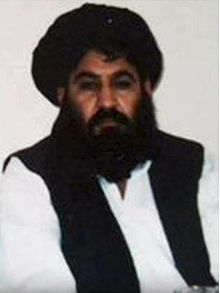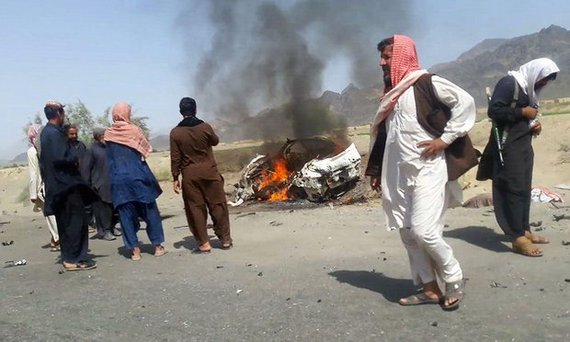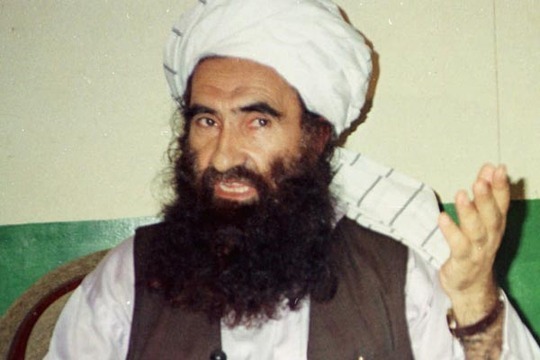Mullah Mansoor's Mangled Vehicle (Photo: theguardian.com)
Last year the Taliban's second leader ever, Mullah Mohammad Akhtar Mansoor, succeeded the founder of the organization, Mullah Omar. He was the 2nd in command when it was revealed that Omar had been dead since 2013. A Taliban splinter group called Fidai Mahaz, loosely translated as Fanatics' Front, issued a statement accusing Omar's lieutenants Mullah Akhtar Mansoor and Gul Agha of killing Mullah Omar in July 2013. Fidai Mahaz did not reveal why and how Omar was killed, but indicated that they had evidence to prove their claim as reported by Khaama Press on July 23rd.
Mullah Akhtar Mansoor (Photo: en.wikipedia.org)
Initially, a number of Taliban including the late Omar's son, Mullah Mohammad Yaqub, opposed Mullah Mansoor's move to head the "Quetta Shura" as the movement is also known. But Mullah Mansoor was eventually able to consolidate power as the leader. However, he ignored the idiom "be careful what you wish for." Mullah Mansoor was a hands on person in running the organization and was even personally involved in operations against other Taliban opposing him. This modus operandi, unlike the reclusive Mullah Omar, exposed him as an easier target. So on Sunday May 22, 2016 while riding in a car in Ahmad Wal Baluchistan, Pakistan, across the southern border of Afghanistan, Mullah Mansoor met his demise. The Pentagon announced that Hellfire missiles unleashed from US drones hit Mansoor's convoy.
There were reports that a Pakistani passport recovered from the scene was issued under the name Wali Mohammad, but the picture closely resembled Mansoor. The passport contained an Iranian visa indicating that Mansoor had traveled to Iran. But none of this comes as a surprise. The Pakistani government has harbored and supported the Taliban for decades. The complexities of events in the Middle East, South Central and South Asia and how they intersect make for strange bedfellows. Iran has had a long standing relationship with the Taliban. From Tehran's point of view, "Good Taliban" do not pose a threat to Iranian interests. On the contrary, they can cooperate to fight the Islamic State in Iraq and Syria (ISIS) or Daesh. The Taliban have historically been supported by Saudi Arabia, which is in a tug war with Iran for influence in the Middle East. Iran is fighting ISIS in Iraq and Syria, an interest which they share with certain Afghan Taliban who have been fighting groups in Afghanistan beholden to ISIS. These Taliban do not want ISIS to establish any kind of control in Afghanistan. The enemy of my enemy is my friend fits the situation perfectly. Shia Iran does not share the Taliban's Wahhabi Sunni vision. But this long standing rapprochement gives the Taliban a certain regional recognition and credibility beyond what their Pakistani and Saudi patrons provide. Tehran in return benefits from the fact that ISIS will not have a foothold on its eastern border, Afghanistan. The media have been abuzz about the death of the Taliban leader and its implications for Afghanistan, the Taliban, the US, the peace process, Pakistan and the region. The first important issue is who will succeed Mansoor as the new head will affect other issues such peace talks, increase in attacks, and so on.
1.It is possible that the question of succession will unleash a wave of violence among the Taliban. Mansoor recently arranged an entente with the notorious Serajuddin Haqqani, the head of the Haqqani Group. As a result Serajuddin was appointed as Mansoor's deputy. Normally the deputy would succeed the head. But Haqqani belongs to the Pashtun tribe of Zardran in eastern Afghanistan. The Taliban leadership and foot soldiers are mostly Durani, affiliated Pashtuns from the southern provinces of Kandahar, Helmand, and others. It is not certain that they will accept a Haqqani leadership. Mullah Yaqub, the late Mullah Omar's son, could be a possible alternative. He has the pedigree, but was not strong enough to succeed his father. If Haqqani becomes the Taliban leader, Afghanistan will be the target of more deadly and spectacular terrorist attacks. The Haqqani Group has the experience and capability of carrying out large scale attacks.
2.Any disarray among the Taliban will be, at least in the short term, beneficial to ISIS affiliated groups in eastern Afghanistan. The ISIS expansion until now has been kept in check to a certain extent by the Taliban. There is also a possibility that ISIS might court any splinter Taliban groups, enhancing their ranks and position.
3.Pakistan is one the biggest losers. It has been trying to keep the Taliban together. Pakistan has used the Taliban as a national security tool vis a vis Afghanistan. Pakistan's image has also been a casualty. They can no longer deny that they have been harboring and supporting the Taliban.
4.The Afghan government and the Taliban peace process never took off, first because Pakistan had kept Afghanistan in the dark about Mullah Omar's death. Secondly, Mullah Mansoor was not ready to talk. Therefore peace talks are not a casualty as there was nothing tangible. However, the talks may take place sometime in the future depending on who will be the new Taliban leader.
5.The US has been systematically eliminating Taliban middle commanders and foot soldiers for many years. But going after the number one Talib is a marked departure from past practice. Is this a one off attack or will the US continue to target Taliban leadership in Pakistan? Time will tell.
Serajuddin Haqqani
There has been a lot of euphoria in Afghanistan about Mullah Mansoor's demise. President Obama called it a "milestone." But eliminating one person may not produce the results that Washington and Kabul desire. Removing Osama Bin Laden from the scene did not result in Al Qaeda's demise. In fact, more lethal groups such as ISIS proliferated. Killing Mullah Mansoor will not usher in the end of the Taliban. Neither will it solve Afghanistan's problems. Afghan woes can only be solved by a government serious about reforms, eradicating the culture of impunity and corruption. The government should also convince the rank and file Afghans that it is a better alternative than the Taliban, and that the government is worth supporting for the good of all Afghans.


